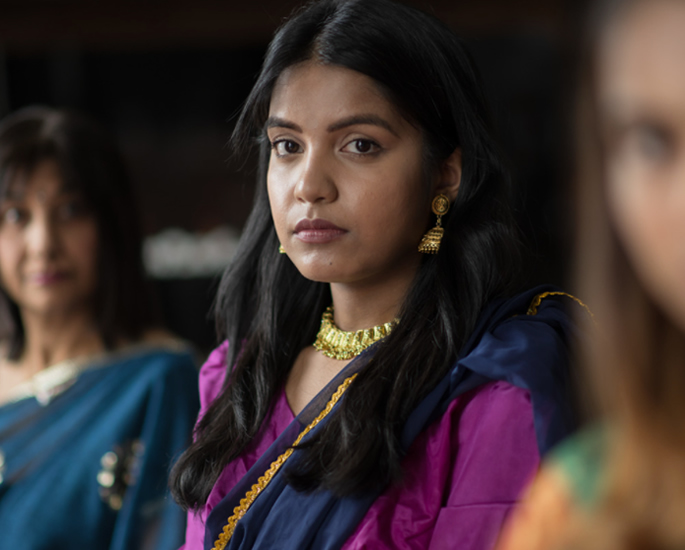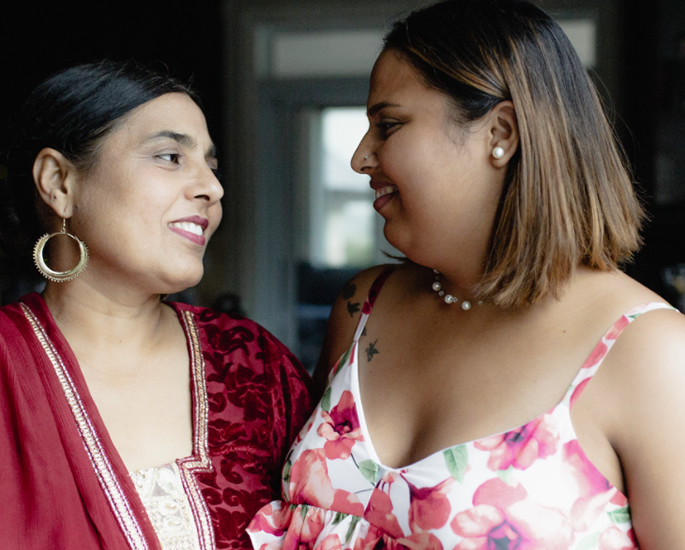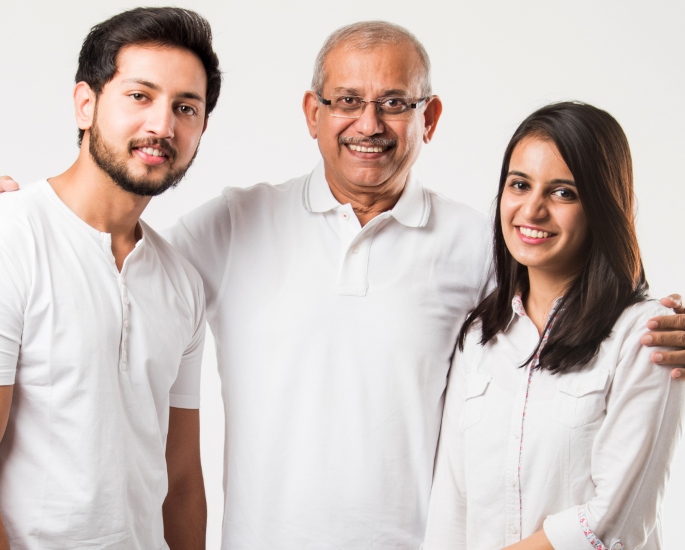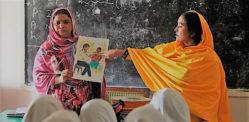"I realised that it’s expected of me to be a virgin"
How did you learn about relationships and sex? Were your parents a source of sex education? If your parents were, how did that conversation(s) go?
Sex education involves offering information on sexuality, contraception, consent, reproductive health and awareness of sexual abuse.
Overall, sex education is deemed important but remains a topic of contention and unease within Desi communities.
Conversations around sex education can make parents and children alike shift in discomfort. This is a reality across the globe and cultures.
Indeed, this discomfort is obvious when looking at Desi parents attempting to approach and even contemplate conversations with their child/children.
British Indian, Alina Singh*, is a 29-year-old single-mum to an eight-year-old boy, Imran*.
After conversations with family members whose children received sex education at school, she has found herself thinking about the future:
“Honestly, makes me feel queasy as hell, I don’t know how or what I’m going to say to Imran when it’s time.
“Schools do plenty, mostly, but as a parent, I’m going to have to, it’s a must. I don’t want him learning from the wrong places and learning the wrong things.”
Alina’s unease contemplating the future conversation(s) she would have with her son was palatable in each word.
Yet, for Alina, not having the conversations would be problematic.
Her silence as a parent would help facilitate misinformation and false expectations – both of which she experienced.
Alina is determined this will not happen with Imran.
At the same time, she is nervous about approaching sex and intimacy with Imran. She is struggling to visualise how to address the matter.
But is this the case for most Desi parents?
DESIblitz looks at whether Desi parents struggle with sex education and the different elements that can make it difficult.
Socio-Cultural Norms around Sex and Intimacy
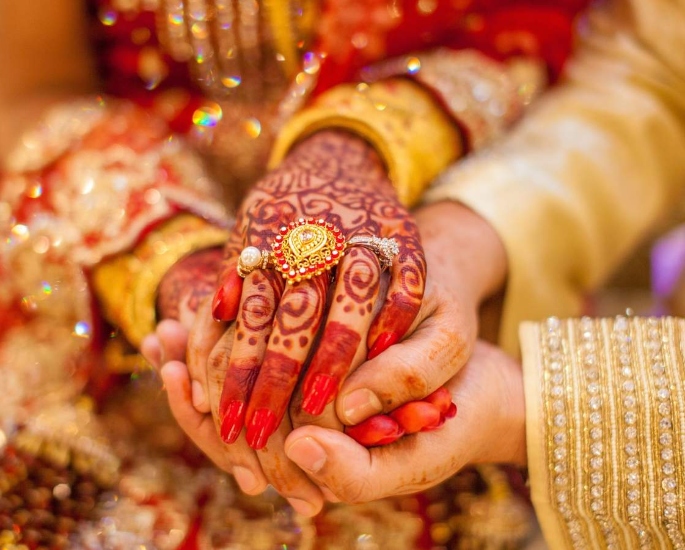
In the 21st century across the globe, sex and sexuality are more visible. Both are more openly discussed and referenced in popular culture and the media.
However conservative and traditional values around sex and intimate relationships exist.
Within Desi communities in South Asia and the diaspora, explicit conversations around the two are still taboo.
Furthermore, open displays of physical affection between couples within family environments are uncommon, especially among the older generation.
Whilst more South Asians are having sex outside of marriage, overall this remains something the family/parents are never to know.
Shabana Azim* a 30-year-old Bangladeshi teacher and mother of four in Scotland maintains:
“Everyone knows it happens, after all, marriage equals little ones, but anything to do with the bedroom or affection in relationships is not to be displayed openly.
“My parents and hubby’s parents still squirm when he gives me a little kiss on the cheek.”
Accordingly, intimacy, dating and sex are often shrouded in shadows, known but not acknowledged across generations and within families. But why is this the case?
Pretending Sexual Relationships do not Happen
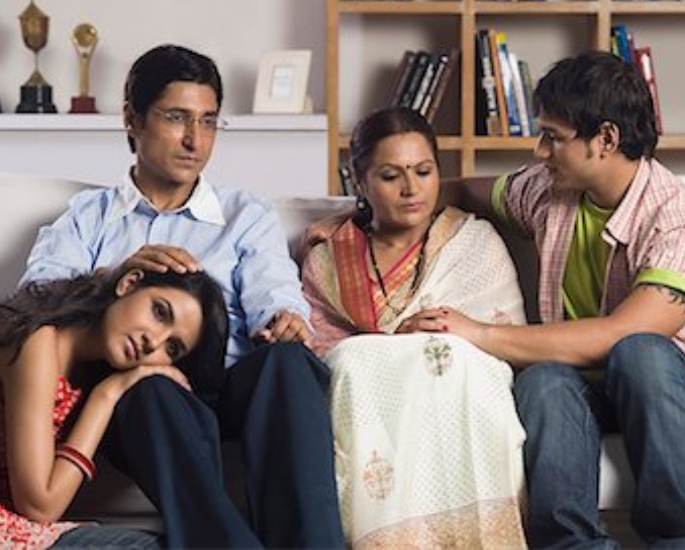
Dating and sex outside of marriage remain hidden in Desi communities, both in Asia and the diaspora.
Anisa Suhail* a 26-year-old Indian/Pakistani student in London was adamant that the illusion of no pre-marital sex was key in her family:
“Crap no. I’d rather walk the plank into water filled with sharks and jellyfish than admit to having sex to my family.”
“My parents know I have a boyfriend – we’ve been together for years and will get married. But what that means is completely ignored.
“I would never say yes we have had sex. The no would be a lie.
“Plus if others found out – some relatives and parts of the community – I’d be labelled a slapper. Although my boyfriend is the only guy I’ve been with.”
For many South Asians, specifically, women, lying about dating and/or sex is a means of protecting themselves from community and family backlash.
In addition to safeguarding her family from socio-cultural stigma, Anisa goes onto say:
“Neither of my parents had the talk with me – about safe sex, consent, that it should be enjoyed, any of it.”
“I guess since it wasn’t meant to be a part of my world until I’m married, they think no need. School was rubbish at it.
“You just learn. Nowadays, info is more accessible out there.
“My younger cousins say Netflix’s Sex Education is really good at explaining things.”
For many popular cultures, media can be a crucial source of gaining information and knowledge – this can be a double-edged sword.
This can lead to misinformation and false expectations, but it can also prevent ignorance.
Traditional views and hopes of children waiting for marriage can be a reason why some Desi parents feel conversations are unnecessary.
Moreover, unease with the idea of children in adult relationships can mean some parents prefer to pretend they do not know.
Saleem Hussain* a 46-year-old Pakistani father of two based in London was pleased his sons never asked him questions:
“We don’t have those talks. When the boys started having girlfriends I prayed they wouldn’t come to me.
“Me and the wife pretended not to know they dated.
“Instead, they went to their older cousins, and anyway they had lessons in school. I didn’t need to do anything.”
Discomfort can prevent engagement on a topic that needs to be normalised within the home.
Undertaking such conversations and creating an atmosphere where Desi children feel comfortable asking parents questions will help them make informed decisions.
A Traditional Desi Parent’s Perspective
Aliyah Jabeen* is a 48-year-old Pakistani mother of four girls, living in Mirpur, Pakistan.
She feels sex education conversations are inappropriate before a daughter is engaged:
“Why would I, there is no need until a rishta occurs. Then I will tell each one what needs to be said…contraceptives and potential bleeding, that’s all.
“I won’t wait until the night before the wedding like my ammi (mother) did.”
For Aliyah, conversations around sex are inappropriate before children are engaged, especially for females.
Nevertheless, she is taking a step away from how her mother approached the matter.
Despite this, traditional values still appear to impede communication and open dialogue.
Furthermore, Aliyah stated that she felt a sense of dread when thinking about such future talks with her daughters. In her words, she expresses:
“I hope I can quickly say what needs to be said, and then never again.”
The dread about engaging in conversations that are not normalised can lead to some Desi parents hoping to avoid the topic as much as possible.
Yet, not all parents feel this way, and some work to do things very differently.
Shattering Generational Silences and Norms
The taboo nature of talking about and naturalising what happens in intimate relationships is something many Desi parents reflect on.
Plus, for a number of parents, the goal is to do things differently.
Sumera Khan* is a 40-year-old Pakistani police officer in London and a mother of three. She has two daughters and one son.
Sumera was ill-informed about intimate relationships and sex before her first marriage, which was arranged:
“No one said anything, absolutely nothing at all. No one would ever have that talk. Nothing was said when I was getting married.”
Consequently, on her wedding night, Sumera found herself entering the unknown. All she knew was that “she had to” do what was expected.
She goes on to say that even sexual health was taboo:
“You know, how now we just pick up pads (sanitary towels) from the shop, back then it was sneaking away to get them. And they were hidden at home.
“You know sex education at school, they [my parents] would send letters saying ‘we withdraw Sumera from this class‘.
“It’s different to how schooling is now. It was more taboo.”
Sumera’s experiences are ones she never wishes on anyone else.
For her, sex education is an important mechanism in helping children become well-rounded adults and understanding healthy relationships.
Accordingly, with her own children, Sumera ensured things were done differently:
“Well with them it’s been very much normalised, it’s never been made an issue.
“Pads weren’t hidden, when they were little it was just ‘oh can you get me one?’, so it was never an issue.
“And when I realised Mia* was interested in boys and Raj* interested in girls, I spoke to them about consent, safety and the rest. I did it in a way that naturalised it.
“Yes, they went ‘ahhh mum, no, ewww!’. But it’s never been something to be uncomfortable with.
“I didn’t want them to grow up with what I had.”
For Sumera, there are positive shifts in attitudes generationally for the most part. However, she feels that for Desi women more so than men, tradition continues to create barriers.
Pushing Through Uncertainty to Engage Kids
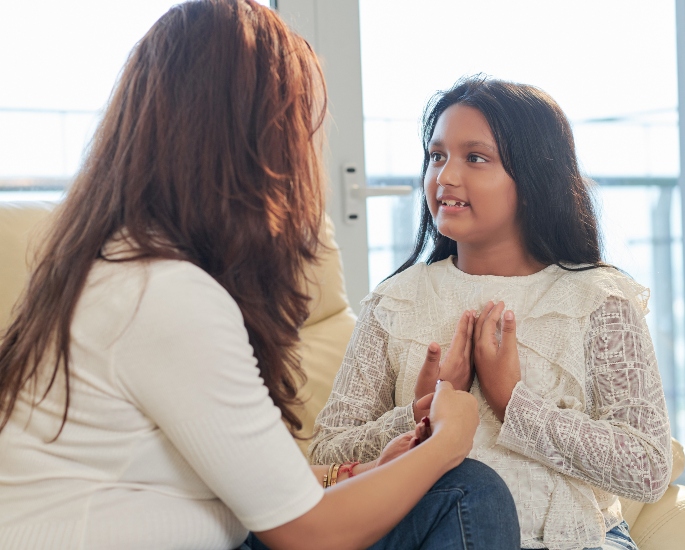
Even where parents want to do things differently, they can struggle due to the silences they faced with their own parents.
Jay Kapoor*, a 49-year-old Indian father of three boys and two girls, works as a lawyer in London.
He and his wife struggled with how to approach sex education as he details:
“Neither my wife’s nor my parents ever had the talk with us, so we were in new territory. We had no idea when was best to start and how much to say.
“It was a lot of trial and error, we did the best with the youngest two.
“The easiest part of the sex education talks, with all the kids, was letting them know about the changes that happen in puberty.”
The ongoing socialisation that sex and all it encompasses is problematic. It leads to Desi parents grappling with trying to work out what is appropriate to say.
Single mum, Alina Singh*, reflecting on the lack of sex education she received states:
“My parents and family said nothing, and honestly no matter how uncomfortable it may have been, I wish they had.
“Sex needs to stop being considered dirty. Sex education shouldn’t be hidden, feared and barely whispered about.”
“The only thing my mum did was make sure I knew what periods were, her mum never told her.
“So when my mum started, she thought she was dying.”
For some like the Desi parents above, their own lack of parental sex education means they are determined to shatter generational silences.
The cultural norms that position sex education as taboo are slowly starting to disappear.
Making sex education a natural part of Desi kids/teenagers lives as they grow is essential.
Doing so in an age-appropriate manner will help shape them into adults with a good understanding of intimacy and their bodies.
Research Looking into Experiences of Parental Sex Education
Research looking into experiences of parental sex education have found similar findings to what has been mentioned above.
For example, Indian American Simran Chand undertook an award-winning undergraduate dissertation.
Her 2020 research focused on experiences of parental sexual communications among second-generation South Asian American students.
Chand found that in the case of familial sexual education, respondents desired open communication.
While 97% of survey respondents did not receive a sex talk, 95% want to have this conversation with their children.
Chand asserts:
“People in my generation prioritise sexual education, they prioritise open sexual expression, and that is something that’s dramatically different from their parents”.
Change is occurring but gendered assumptions and inequality can be reinforced and/or be hurdles to overcome, for parents and children.
Gender Inequality Attitudes to Sex and Intimacy

In many cultures, men are applauded for their sexual activities, whereas women are judged, reprimanded, disowned and even killed.
Indeed, this remains true within Desi communities.
In Desi families and communities, a woman’s virginity is equated with izzat (honour). Hence, sex is deemed to be for the marriage bed and to produce children.
Accordingly, some parents may feel it’s unnecessary to have conversations about reproductive health, consent and contraception.
Fozia Ahmed* a 46-year-old stay at home mum in Birmingham, UK, strongly feels that outside conversations about menstruation, unmarried girls should be told nothing else:
“You keep your legs closed, that’s what my ammi told me and what I told my girls.”
“To do anything before marriage is a sin, shameful.
“Periods, checking breasts for lumps that is fine. The rest can be learnt once they are married, then I will talk to them.”
When asked if she had the same conversation with her son who is 21, Fozia gave a firm no, stating:
“I’m sure his aba (dad) has said something, he’s a good boy, mashallah.”
The traditional norms and expectations around sex and intimacy are a way in which women’s bodies in particular are judged.
Additionally, attitudes to male and female engagement with sex are often viewed unequally.
After marriage, indirectly, “sex is celebrated by the community for providing a family and grandchildren”.
Yet what about normalising sex as a means of pleasure for both men and women?
Natasha Bhol* a 30-year-old Indian teacher in Canada feels this is one aspect of sex education that parents and schools struggle with:
“I’ve spoken to many Asian and other parents who find it extremely challenging to discuss any of this with their kids.
“I’ve found there is a stark absence of talks about the pleasure that should be had, especially for women.”
Sex education, when it comes to matters of pleasure and orgasms, especially for women, remain powerfully taboo within Desi households.
Female sexuality is still considered dangerous and the route of temptation for men, when it does not adhere to cultural rules and expectations.
Such conversations in Desi communities and more broadly still have a long way to go.
Sex Education Shifting with Each Generation?
As in other communities, the overarching lack of education isn’t uncommon across the spectrum.
Yet the question is, are things shifting with each generation?
Meena Patel reveals her experience. She met her boyfriend, Girish Patel, in Leicester. Subsequently, they moved to London for their careers. They then moved in together.
“We have been living together for over four years now. Obviously, we both wanted to live together in London but we were really nervous about how our families would react.
“Surprisingly, both sides were very supportive. It has made me really happy because it shows that they value our relationship, even if we are not married.”
Amrit Matharu, as a producer for BBC Asian Network, took part in a project on this topic.
From a Sikh background, her experiences show that traditional values remain:
“After a recent conversation with my mum for a BBC film around discussing sex with your parents, I realised that it’s expected of me to be a virgin ’til marriage.
“Though I do think attitudes are changing as we’re in a modern culture to accept that young people, not just British Asian but all young people are owning their sensuality.”
The clash between tradition and the realities of contemporary Desi relationships remains fraught.
Nonetheless, shifts are occurring across communities and within families.
Generational Conflict & Parent-Child Ties
Desi families often involve extended family members in these matters to provide advice and support.
This is a beautiful component of Desi communities, but it can lead to difficulties.
Difficulties manifest when there are opposing views and attitudes.
Mohammed Ali* and his wife Sara* found themselves facing extended family criticism due to addressing the matter of sex education/health with their children.
Such criticism was levied at them due to the honest conversations they had with both their teenage son and daughter:
“Kids talk, and when ours told their cousins that we are open about talking about relationships, consent, STDs, it got around the family.
“The older aunts, uncles and parents were outraged and warned us that our kids would do sinful things.
“Unfortunately, they completely ignore the reality of what the kids see around them in adverts, tv and films.”
It can be assumed that discussing sex education will lead to young people having premarital sex, having sex early, or being promiscuous.
However, research suggests that providing sexual education to young people often results in delaying their first sexual experience.
For Ali and Sara, the decision they made seriously detoured from expected norms in their family. But it is a decision they do not regret:
“We’re both more than glad we decided to be open.”
“Our relationship with the kids has a tone that we do not have with our parents.
“The kids learn much from tv, friends and schools, but our approach means they know they can come to us.”
Over the decades, as within other cultures, interactions and communication between Desi parents and children have shifted, becoming more open.
We live in a world where visuals saturate our lives.
Sexualisation and sex are more prominent in culture. Accordingly, the home/family can not be absent from the conversations needed.
Sex Education & the Silence on Same-Sex Intimacy
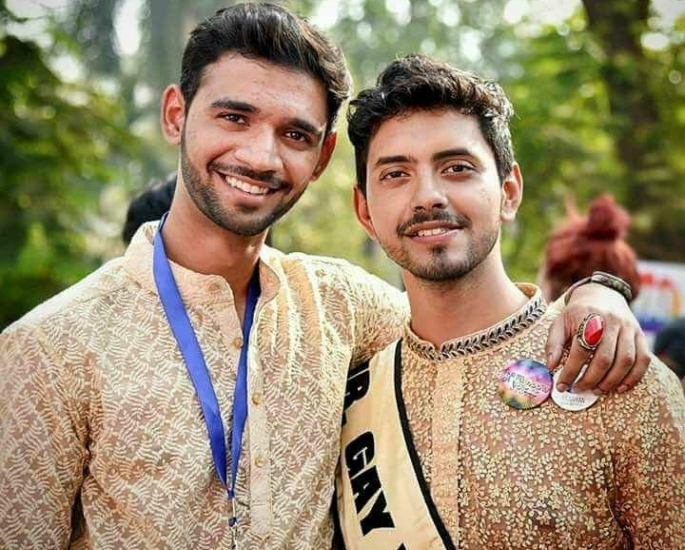
Sex education, when given, is very heteronormative. The focus in sex education is on heterosexual relationships and intimacy.
But what happens when it comes to sex education for those who identify as LGBTQ+?
Sexual identities that fit outside heterosexuality can still be culturally taboo, including in Desi communities.
However, significant changes have and continue to occur that are more inclusive.
Despite this inclusion in the UK and other places, some parents from Desi and other communities have protested the changes.
Nonetheless, the protests have not stopped change.
For example, in New Delhi, Indian schoolchildren are learning about same-sex couples in a new textbook, following the decriminalisation of gay sex in 2018.
Yet, heterosexuality is still the norm and more focused on.
Consequently, as Dr Sara C. Flowers, vice president of education for Planned Parenthood Federation of America, told the Insider in 2021:
“Queer young people are often left out of the conversation altogether.
“This can result in a lot of misinformation about their identities, bodies, and health.
“Leaving them without the skills or resources, they need to have healthy relationships or safe sex, if and when they make that decision.”
Suppose there are tensions and missing information from sex education in schools. What does this mean for the parents?
Indian postgraduate student, Alex Kapoor*, is a 32-year-old bisexual from America.
Her immediate family have not treated her any different since she came out aged 15. However, one thing she and her family struggled with was sex education:
“My parents have been so cool about everything when my uncles said some rubbish, they shut them down straight away.”
“Mum did good with the advice on heterosexual sex education, but the other side of it, for relationships with women, she stumbled massively.
Laughing, Alex went on to say:
“I was the one giving my mum sex education lessons when it came to what it means when dating girls/women.
“One thing my parents said is no matter who I date, treat them as I want to be treated, and that respect and consent are key.”
Within the home and more broadly, inclusive sex education is increasingly needed.
Advice for Parents
Desi and other parents who identify as heterosexual or are uninformed may find discussing LGBTQ+ intimacy and sex daunting. However, this should not prevent parents from trying.
Gayathiri Kamalakanthan, from the UK School of Sexuality Education, in conversation with PinkNews made several important points.
Regarding parents who feel uncomfortable or ill-informed to discuss sex and relationships with children, she stressed to “spend time teaching yourself”:
“It’s important that we try our best not to pass on our learnt shame and embarrassment.”
“There are some really great, free resources online that can help heterosexual/cis-gendered/ uninformed parents talk to their kids about LGBT+ identities.
“It can seem daunting at first – there might be a lot of new vocabulary and it’s easy to confuse different terms.
“Let your kids know that you are learning with them.
“Tell them that it’s okay to get things wrong as long as you are willing to listen and learn from the people who are best placed to teach you.
“You might find that your child starts teaching you things and that’s great.
“Listening to what they have to say will empower them – they’ll want to keep learning alongside you.”
Parents need to be open to and facilitate a safe space for discussions and questions.
Thus allowing Desi children not to fear going to their parents. Doing so will also help destigmatise sex and sexuality.
Evolving Times for Desi Sex Education?
Desi parents continue to struggle with navigating the terrain of sex education.
However, many are determined to do things differently from their parents and grandparents.
On the other hand, some think that sex education is not an appropriate matter for parents to discuss with unmarried children. It could encourage young people to become sexually active.
However, research has repeatedly shown that a lack of awareness and knowledge is exceptionally problematic.
Those who are better informed are more likely to delay becoming sexually active.
For example, a 2013 study done by the Family Health Bureau found 50% of young people in Sri Lanka had limited knowledge about sexual reproduction and health.
Additionally, many failed to answer basic questions about reproductive health.
Only 45.6% of girls knew that pregnancy could result from the first sexual intercourse.
Also, only 53.3% of the total samples were aware that missed menstruation could indicate pregnancy.
Furthermore, research has shown that there is a high prevalence of abortions and sexually transmitted illnesses (STIs) in Pakistan, with general knowledge about the issues being poor.
For example, in 2012, there was an estimated total of 2.2 million abortions in Pakistan.
Also, The Joint United Nations Programme on HIV/AIDS (UNAIDS) estimates that in 2016, 130,000 people were living with the Human Immunodeficiency Virus (HIV) in Pakistan.
Moreover, according to a UN report, 28.7 % of women in India give birth to their first child before 15-years-old.
These statistics show that positioning sex education/health and sex as taboo and the silence on the matter is not preventing young people from having sex.
Sex education means young people will be informed about reproductive health, STDs, and their bodies.
It is also important due to its awareness of abuse, abortions, and sexual safety.
The continued struggle Desi parents have discussing issues around sex education is perhaps an inevitable facet of the many parent-child relationships.
But such struggles should not stop conversations from happening.
For Desi communities in the diaspora, the parental struggle with sex education also tells us much about the migration story.
A story that showcases the tensions between different generations whilst shining a light on the complexity of living in two cultures.
Young South Asian people are required to negotiate their sexual development and transition to adulthood while navigating social-cultural norms.
Hence, parents do not need to have all the answers.
Rather, they need to be part of creating spaces and conversations that normalise sexual education in everyday life.





















































